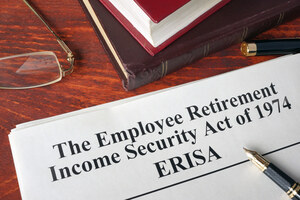 Not coincidentally, this decision could be a big blow to oil and gas interests. On the other hand, it could amount to very little, since ESG considerations are only to be permitted as “tie-breakers” when investment managers have equally valuable options to consider. The plaintiffs have indicated that they intend to appeal the District Court’s decision to the Fifth Circuit, and the political debate is certain to continue.
Not coincidentally, this decision could be a big blow to oil and gas interests. On the other hand, it could amount to very little, since ESG considerations are only to be permitted as “tie-breakers” when investment managers have equally valuable options to consider. The plaintiffs have indicated that they intend to appeal the District Court’s decision to the Fifth Circuit, and the political debate is certain to continue.Evolving interpretations of ERISA fiduciary rules
ERISA Section 404 requires plan fiduciaries to act prudently and for the exclusive benefit of participants and beneficiaries and to pay reasonable expenses of the plan. But one fiduciary’s prudence may be another’s wild flight of fancy. “Prudence and loyalty,” are evolving concepts.
Over the last 40 years, the Department of Labor has periodically revisited the question of how this duty applies to plan investments that promote environmental, social, or governance goals. Prior to 2021 the DOL had taken the position (the “2020 guidance”) that ERISA does not prohibit fiduciaries from making investment decisions that reflect ESG considerations. The controlling factor in determining whether an investment meets the prudence requirement remains the potential for benefit to participants and beneficiaries.
In 2021, under the Trump administration, the DOL published a rule (the “2021 rule”) that limited ERISA fiduciaries to making investment decisions based “solely on pecuniary factors.” In 2022 the Biden administration addressed the question again. The resulting new 2022 rule permits fiduciaries to consider “the economic effects of climate change” and other ESG factors when making investment decisions, so long as the considerations remain rooted in the typical risk-reward analysis generally thought to be required by the legal standard.
Little meaningful daylight
The District Court’s primary reasoning for upholding the 2022 rule was that it was consistent with the Labor Department’s 2020 guidance. The 2022 rule “change[d] little in substance” with respect to a fiduciary’s duties. The 2021 rule appears to have been the outlier.
The 2022 rule restates the 2020 guidance that risk and return factors may include ESG factors under some circumstances, but those factors must still reflect a reasonable assessment of its impact on risk and return. The court held likewise that there was “little meaningful daylight” between the old and new tiebreaker provisions.
So, what was all the kerfuffle about?
Fossil fuel investments
In their lawsuit, the plaintiffs, which include twenty-six “red” states, an energy company and its subsidiary, an oil and gas trade group, and one individual plaintiff, argued that ESG investing practices would limit the investments that oil and gas companies receive from the public markets, hurting those companies, the states that they operate in, and their employees.
Additionally, they argued that ESG investing would result in lower returns for defined contribution plan participants. Some argue that the individual plaintiff, a participant in an ERISA retirement plan, was essential largely to give the plaintiffs standing to sue in federal court.
More lawsuits and potential legislation on the horizon
The 2022 rule still faces a challenge in Braun and Luehrs v. Walsh, an ERISA lawsuit pending in the Eastern District of Wisconsin. According to the Braun Complaint:
“Congress never granted President Biden the authority to override ERISA’s text and its stated objective to protect retirees in favor of progressive policy dreams like social credit scores, reducing pay for CEOs, or instituting racial quotas for corporate boards. ESG Rule violates ERISA and exceeds the authority granted to the Secretary [of Labor] by statute. In addition, it unlawfully politicizes the retirement system and, in doing so, puts the retirement savings of millions of Americans at substantial risk in service of a policy choice not found in ERISA or otherwise enacted by Congress.”
READ MORE ERISA VIOLATION LEGAL NEWS
In March, Senators Jon Tester and Joe Manchin joined Senate Republicans to pass H.J. Res. 30, aimed at repealing the 2022 rule. President Biden vetoed the measure, but many expect to see similar efforts in the future. For the moment, though, the 2022 rule upholding the use of ESG factors under certain circumstances has survived.
